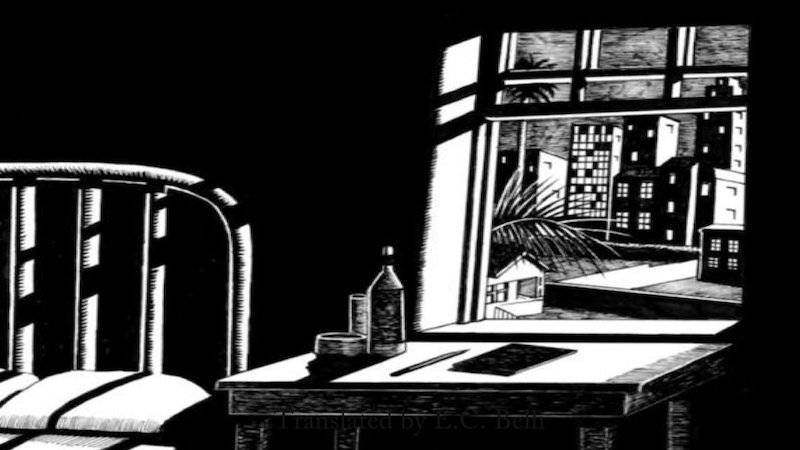MFA vs. Everything:
Four Writers Weigh In
With Whitney Terrell and V.V. Ganeshananthan on Fiction/Non/Fiction
In this episode of the Fiction/Non/Fiction podcast, fiction writers Elizabeth McCracken and Tony Tulathimutte and poets Kathryn Nuernberger and Hadara Bar-Nadav talk about graduate programs in creative writing with hosts V.V. Ganeshananthan and Whitney Terrell.
To hear the full episode, subscribe to the Fiction/Non/Fiction podcast through iTunes, Google Play, Stitcher, Spotify, or your favorite podcast app (make sure to include the forward slashes when searching). You can also listen by streaming from the player below.
Readings for the episode
The Program Era by Mark McGurl · “MFA vs POC,” The New Yorker, Junot Diaz · “The Writers’ Workshop,” by Frank Conroy, from Dogs Bark But the Caravan Rolls On · Decanon · Private Citizens by Tony Tulathimutte · Bowlaway by Elizabeth McCracken (forthcoming) · “How To Apply To An MFA Program“, Tin House, Seth Fried
![]()
PART ONE
“I think it’s pretty much completely spurious that there’s a stylistic preference at Iowa.”
Elizabeth McCracken and Tony Tulathimutte on whether programs have aesthetic preferences
V.V. Ganeshananthan: Elizabeth, you and I have been discussing reading MFA admissions off and on for years, basically since I started doing it. And it seems like one of the things that’s interesting about your program in particular is that there are two MFA programs at UT Austin, and we got a question from one of our listeners asking about aesthetic preferences, which also comes up in Tony’s passage. Do programs really have aesthetic preferences?
Elizabeth: Oh my gosh, I really do think that reading MFA applications, which I love, and is exhausting, [unintelligible], mind-numbing, and comforting—but there’s such a big element of total randomness to it. It depends on how long you’ve been on a bad streak, and read a bunch of applications you don’t like, and how tired you are, and who is on the jury with you.
I think that rumors about what certain programs like—it’s not useful to listen to those because as far as I can tell they’re also frequently about 15 years out of date–
Tony: Yep, yep.
Elizabeth: And you sort of think—oh, this program likes this. I think you’re much better off looking at the courses that the program teaches, so that if you see that an MFA program teaches classes in speculative fiction, you will know that your work will be welcome there.
Tony: Yeah. The only program that I’m really aware of that is known for having a stylistic preference, or bent, is Brown, right, which, what I’ve heard about it is that it tends to favor avant-garde writing, but other than that I think it’s pretty much completely spurious that there’s a stylistic preference at Iowa. Like Elizabeth said, a lot of what is said about programs in general, and Iowa in particular as a kind of synecdoche for the whole thing, are based on its reputation from the 80s, you know, under Frank Conroy or whatever, back when they have competitive funding and everyone got ranked on a list in front of everyone. It’s also why it’s known as being cutthroat. Like, when everyone was, basically, white. The program, now, is diverse on a lot of different levels, and there’s no point in trying to game it. At Iowa, in particular, there’s a completely different reading pool of first readers made of whoever’s in the second year of grad students that year, right? There’s no consistency to it whatsoever.
I think that people use “MFA fiction” as a byword for mediocre, or unambitious, or kind of like mundane realists, Updike-ian literature, but it’s because that’s kind of what all fiction is like. Like, the universal output. And because stuff that comes out of not-an-MFA-program isn’t institutional, there’s no institution to blame as a proximal cause. That doesn’t get chalked up as product of an ideology. I think that—about the application part of it, yeah, it’s totally pointless to try to game out what they’re going to like the most. I think that rather than the style, or the subject matter, you really should take a look more at what you’re asking an extremely harangued jury committee member to read in order to evaluate you. One thing I really don’t like is when people put in eight very short stories because we had to do individual write-ups of about half a page for every single story included, and that just added a ton of work. It was more exhausting, right? If it’s really good stuff we might overlook that, but I generally like two or three pieces at most. You don’t have to max out the page count of whatever it is, especially at programs where they let you send 80 to a hundred pages of manuscript material. You don’t have to max that out—just lead with your best stuff.
![]()
PART TWO
“A really excellent system of patronage, where you get to stay in a sheltered space that’s really conducive to doing creative work.”
Hadara Bar-Nadav and Kathryn Nuernberger on MFAs vs PhDs
V.V. Ganeshananthan: And here we return to our poetry correspondents! Our next question comes from Erin Saxon, of UMKC: “I’m not sure if this branches too far from the MFA application process,” she asks, “but I wonder if the MFA is still considered a terminal degree. There are several creative writing PhD programs out there, and new ones popping up all the time. Is a PhD a good idea? Is it only for people who want to teach at universities, and how valuable is it for those who want to be professors?”
Hadara Bar-Nadav: To me, the PhD made sense. I already had a master’s degree in literature, in English, I did not have an MFA in creative writing, and I knew I wanted to teach on the university level, and what I had said to myself was I applied to both PhD and MFA programs, and if I got into PhD programs with funding, I was gonna do them, because I knew it was a terminal degree, and nobody could debate that. However, the MFA is somewhat debatable, depending to whom you’re speaking with about it. What I saw when I was looking at the job market many, many years ago, were statements like “MFA or PhD required, PhD preferred,” and that was a message that stuck with me from actual job ads.
I haven’t looked at the job ads in a long time, and I don’t know how the language may have shifted, but I knew that having a PhD would credential me to teach both poetry and literature, and I have a serious commitment to scholarship, and to reading, and to the study of literature, so I wanted to be able to credential myself as somebody who could teach creative writing and literature, which is exactly what I do now. I guess, in the end, I could just speak to my path and say that the PhD in creative writing was one of the tools that got me a tenure-track job.
Whitney Terrell: Kate, what about you? You have a PhD too, don’t you?
Kathryn Nuernberger: Yeah, and I loved getting my MFA and I always encourage students to go for the MFA, because that focus on craft and the heavy emphasis on workshopping was so productive, I think—definitely for me, but I think it’s just a really productive experience in terms of becoming a really polished writer. I also think that the way the numbers in the cohorts tend to work, an MFA program tends to have a large group of writers coming in, like, 12, or 20, or something, so you’re with a big group of people who are really passionate about writing and that can be a really unique and special experience in your life, to be plopped into a social situation where you’re surrounded by people who love this thing that you’ve maybe been doing in isolation for a long time.
The PhD cohorts tend to be much smaller, or at least it seems like a lot of the programs I’m aware of tend to be just like–
WT: Oh, so there’s less friends to make.
KN: Yeah, so when I got to my PhD I was the only PhD poet coming in that year—
WT: Yeah.
KN: …And there had only been several years of PhD poets coming in, so we were a very small group, and then the way that program was structured was, it was MA/PhD, so there were MA students doing [literature], and maybe doing a creative dissertation, a creative thesis–
HBN: Ours was the same.
KN: …but it wasn’t the same level of creative intensity that an MFA had, but I also loved doing a PhD, and one of the reasons it was great to follow up the MFA with a PhD is ’cause the university system, especially if you can find a path through that is a full funded path, it’s a really excellent system of patronage, where you get to stay in a sheltered space that is really conducive to doing creative work, if you like teaching, and I do like teaching. So for me, I didn’t have a book yet, I knew I wasn’t going to be competitive on the job market in a meaningful way, I preferred not to go back to teaching high school ’cause I found that to be very draining, so it was great to go on to a PhD and have four or five or six more years that I felt really confident I could just keep writing, and do the kind of work that served the writing instead of sucking away my energy from writing, so from a real practical point of view, sometimes for me the scholarly environment was a little of the “square peg, round hole,” or sometimes I was taking classes where I felt like I was maybe jumping through hoops, but I was always like, this hoop is so much better than the other kinds of hoops I would be jumping through in a different kind of job right now–
HBN: Yes, I agree with that.
KN: …so I am grateful for this class.
WT: What you’re pointing out is that you can take an MFA and get a PhD. You can do both things, you can go from one to the other—you can sort of—do the MFA, and then, right–
KN: Yeah, and what Hadara is saying about going on the job market with a PhD, it is helpful to have the PhD on the job market because you might be applying for jobs where you’re gonna be at a small, regional university where they’re gonna be asking you to teach all kinds of classes at all levels. You might not be going for an MFA faculty position for your first job, you might be going for something where you’re just going to be teaching [literature] classes, [composition] classes, and a couple creative writing workshops, and in that scenario, the people on the hiring committee, who will be your colleagues, are likely literature specialists with PhDs, and so being able to have that shared experience, being able to speak intelligently and meaningfully to their research interest, actually be a better colleague to them, and it certainly helps you sell yourself as potentially a better colleague because you have had a lot more overlap in terms of your scholarly preparation.
Transcribed by Damian Johansson




















